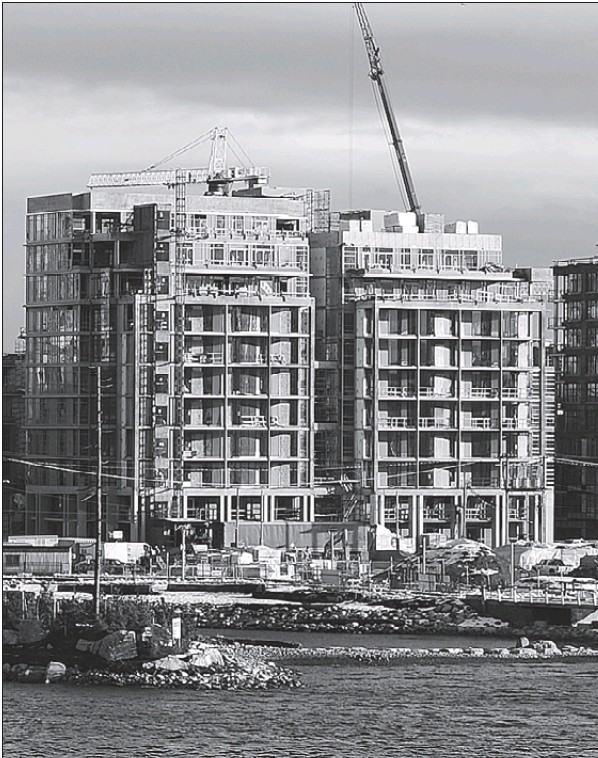Peter Ladner
Sun

The Olympic Athletes’ Village under construction on False Creek: A development jewel with a rigid deadline and an unknown bottom line. — STEVE BOSCH/ VANCOUVER SUN
Mayor Gregor Robertson and his council have to focus on protecting taxpayers and completing the Olympic village project on time, rather than using inflammatory rhetoric and misleading information to blame selected members of the previous council for problems beyond their control.
No one was able to predict the unprecedented real estate market meltdown, credit freeze and skyrocketing construction costs that undermined the financial feasibility of the project.
These were compounded by the city’s commitment to meet a rigid November 2009 completion deadline, dating back to the Olympic bid agreement signed in November 2002. That agreement, followed by the 2003 signoff on the bid with no indemnity from the province for costs over $ 30 million, was the first of two key decisions that got us to today.
To paraphrase the mayor, the athlete’s village is a billion-dollar project and the city taxpayers own it. To suggest that the cost to city taxpayers will be anywhere near $ 1 billion is inaccurate, inflammatory and highly irresponsible.
Yes, the current level of financing risk is major problem, but the ultimate financial outcome is still unknown, and the project is still a development jewel. The bottom line on the project won’t be known until the $ 875-million cost to complete is offset by sales of all the units.
The $ 875-million outside-cost estimate doesn’t take into account the $ 70 million in equity Millennium has in the project, the $ 50 million contingency still to be released by Fortress, and the $ 200-million-or-so guarantees the city has in the form of Millennium’s other holdings worldwide. Add all that up, subtract anticipated price discounts, and the project is still on track to break even.
This project will not land on the taxpayers. It is being financed under the property endowment fund, worth $ 2.7 billion at the peak of the market, and well able to buffer the taxpayers from any possible losses — just as it grew to $ 2.7 billion without any call on the taxpayers.
The second key decision that exposed us financially was the internal Southeast False Creek steering committee’s agreement to heed our legal staff’s advice to give Millennium a ground lease instead of taking the company’s $ 193 million and giving it title to the property. Having the city retain title to the land was felt to be the only way we could guarantee delivery on time.
The city’s involvement in the Olympic village project now spans four councils. Virtually all the decisions have been unanimous, reflecting the commitment of all the councils to complete this project and make it a model of sustainability.
People also have to understand that all the recent decisions, including the divided and gut-wrenching June 2007 decision to formally guarantee completion and a $ 197-million construction guarantee, as well as the unanimous October 2008 $ 100million loan authorization, were made under tremendous time pressures to meet the immovable November 2009 deadline.
The time crunch was hugely exacerbated by the COPE council’s sevenmonth revamping of the official development plan in 2004-05 to add tens of millions of dollars in social amenities that we now know the city couldn’t afford.
The biggest disagreements on this project were in late 2005, when the new NPA council made an unpopular political decision to scale back the COPE-mandated subsidized housing in the project to reduce the city’s financial risk by an estimated $ 65 million.
Vision and COPE have consistently argued for increased public spending on social housing, subsidized housing and daycare at this site, moves that would further weaken the city’s financial position.
What is needed now is for everyone to pull together, acknowledge past mistakes, and negotiate the best deal to complete this project on time and with the least possible exposure to city taxpayers.
That is more easily done without accusations, finger-pointing and exaggerated scare tactics.

